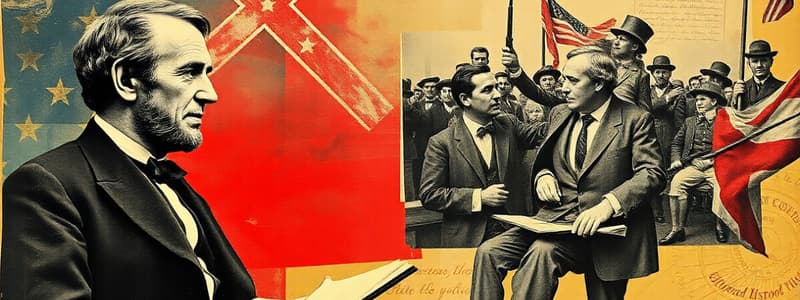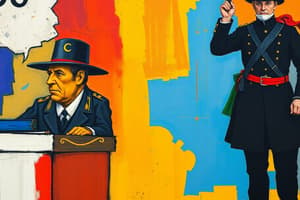Podcast
Questions and Answers
What strategy did Lincoln employ to increase his visibility during the 1858 Senate race?
What strategy did Lincoln employ to increase his visibility during the 1858 Senate race?
- He published a book outlining his views on slavery.
- He staged a series of public debates with Stephen Douglas. (correct)
- He formed alliances with influential party leaders.
- He traveled extensively throughout Illinois promoting his campaign.
What consequence did Lincoln's emergence as a political figure during the 1858 election have on the Democratic Party?
What consequence did Lincoln's emergence as a political figure during the 1858 election have on the Democratic Party?
- The Democrats maintained their majority in the House of Representatives.
- The party faced a division leading to the nomination of two separate candidates in 1860. (correct)
- The party unified under Douglas's leadership.
- The party gained significant support in Northern states.
Why did Southern Democrats oppose Stephen Douglas during the 1860 Democratic Convention?
Why did Southern Democrats oppose Stephen Douglas during the 1860 Democratic Convention?
- His Freeport Doctrine challenged the idea of protecting slavery. (correct)
- His policies favored Northern interests over Southern concerns.
- He lost key debates against Lincoln, diminishing his credibility.
- He was seen as too favorable towards the abolitionist movement.
Which candidate in the 1860 election secured the most electoral votes?
Which candidate in the 1860 election secured the most electoral votes?
Which state initiated the wave of secession following Lincoln's election?
Which state initiated the wave of secession following Lincoln's election?
How did the Election of 1860 impact the political and social fabric of the United States?
How did the Election of 1860 impact the political and social fabric of the United States?
What was the primary intention behind the formation of the Constitutional Union Party in the 1860 election?
What was the primary intention behind the formation of the Constitutional Union Party in the 1860 election?
What was the main reason for the split within the Democratic Party during the 1860 convention?
What was the main reason for the split within the Democratic Party during the 1860 convention?
What significant impact did the 1858 Senate election between Lincoln and Douglas have on the national political scene?
What significant impact did the 1858 Senate election between Lincoln and Douglas have on the national political scene?
Why was the 1860 election considered a turning point in the sectional crisis?
Why was the 1860 election considered a turning point in the sectional crisis?
Which of these was NOT an advantage the Union had over the Confederacy at the start of the Civil War?
Which of these was NOT an advantage the Union had over the Confederacy at the start of the Civil War?
What was the main goal of the 'Anaconda Plan' during the Civil War?
What was the main goal of the 'Anaconda Plan' during the Civil War?
Which Union general was successful in gaining control of the Mississippi River?
Which Union general was successful in gaining control of the Mississippi River?
What was the significance of the First Battle of Bull Run?
What was the significance of the First Battle of Bull Run?
What is 'total war' as practiced by General Sherman during the Civil War?
What is 'total war' as practiced by General Sherman during the Civil War?
What was the strategic importance of gaining control of the Mississippi River for the Union?
What was the strategic importance of gaining control of the Mississippi River for the Union?
Which of these Union generals was known for his successful execution of 'Total War' against the Confederacy?
Which of these Union generals was known for his successful execution of 'Total War' against the Confederacy?
Following the early success of relying on volunteers during the Civil War, what measure did the Union government adopt to increase troop numbers?
Following the early success of relying on volunteers during the Civil War, what measure did the Union government adopt to increase troop numbers?
What was a primary factor contributing to the widespread opposition to the draft in the North?
What was a primary factor contributing to the widespread opposition to the draft in the North?
What was one significant consequence of the Confederacy's extensive use of paper currency to finance the war?
What was one significant consequence of the Confederacy's extensive use of paper currency to finance the war?
What was the primary reason for the Confederacy's reliance on paper currency to finance the war?
What was the primary reason for the Confederacy's reliance on paper currency to finance the war?
Why were "Copperheads" opposed to the Union draft?
Why were "Copperheads" opposed to the Union draft?
Which of the following groups were most likely to oppose the Union draft?
Which of the following groups were most likely to oppose the Union draft?
What action did Lincoln initially take to address the low number of troops in the army in 1861?
What action did Lincoln initially take to address the low number of troops in the army in 1861?
What was one consequence of the national draft law passed in March 1863?
What was one consequence of the national draft law passed in March 1863?
What was a significant impact of inflation on the Confederate economy by 1865?
What was a significant impact of inflation on the Confederate economy by 1865?
Which demographic groups showed significant opposition to the draft in the North?
Which demographic groups showed significant opposition to the draft in the North?
Flashcards
House Divided Speech
House Divided Speech
Lincoln's speech emphasizing the conflict between slavery and sectionalism.
Lincoln-Douglas Debates
Lincoln-Douglas Debates
A series of debates between Abraham Lincoln and Stephen Douglas focusing on slavery.
Freeport Doctrine
Freeport Doctrine
Douglas's assertion that territories could decide on slavery despite the Dred Scott decision.
Election of 1860
Election of 1860
Signup and view all the flashcards
Democratic Party Split
Democratic Party Split
Signup and view all the flashcards
Abraham Lincoln's Platform
Abraham Lincoln's Platform
Signup and view all the flashcards
Breckenridge's Support
Breckenridge's Support
Signup and view all the flashcards
Constitutional Union Party
Constitutional Union Party
Signup and view all the flashcards
Secession Trigger
Secession Trigger
Signup and view all the flashcards
Confederate States Formation
Confederate States Formation
Signup and view all the flashcards
Jefferson Davis
Jefferson Davis
Signup and view all the flashcards
Lincoln's Inaugural Address
Lincoln's Inaugural Address
Signup and view all the flashcards
Fort Sumter
Fort Sumter
Signup and view all the flashcards
Relief Expedition
Relief Expedition
Signup and view all the flashcards
Douglas-Lincoln Challenge
Douglas-Lincoln Challenge
Signup and view all the flashcards
Emergence of Lincoln
Emergence of Lincoln
Signup and view all the flashcards
Freeport Response
Freeport Response
Signup and view all the flashcards
Lincoln's Following
Lincoln's Following
Signup and view all the flashcards
Union Advantages
Union Advantages
Signup and view all the flashcards
Confederate Advantages
Confederate Advantages
Signup and view all the flashcards
Anaconda Plan
Anaconda Plan
Signup and view all the flashcards
First Battle of Bull Run
First Battle of Bull Run
Signup and view all the flashcards
Total War
Total War
Signup and view all the flashcards
Union Population Advantage
Union Population Advantage
Signup and view all the flashcards
Southern Generals
Southern Generals
Signup and view all the flashcards
Home Soil Advantage
Home Soil Advantage
Signup and view all the flashcards
Control of the Mississippi
Control of the Mississippi
Signup and view all the flashcards
Sherman's March to the Sea
Sherman's March to the Sea
Signup and view all the flashcards
Union Industrial Advantage
Union Industrial Advantage
Signup and view all the flashcards
Southern Troop Morale
Southern Troop Morale
Signup and view all the flashcards
Control of the Mississippi River
Control of the Mississippi River
Signup and view all the flashcards
Four-Phased Plan
Four-Phased Plan
Signup and view all the flashcards
Draft Law of 1863
Draft Law of 1863
Signup and view all the flashcards
New York City Draft Riots
New York City Draft Riots
Signup and view all the flashcards
Confederate Currency
Confederate Currency
Signup and view all the flashcards
Conscription Act (1862)
Conscription Act (1862)
Signup and view all the flashcards
Inflation in the Confederacy
Inflation in the Confederacy
Signup and view all the flashcards
Lincoln's Draft Law
Lincoln's Draft Law
Signup and view all the flashcards
Confederate Currency Inflation
Confederate Currency Inflation
Signup and view all the flashcards
Union Volunteer Challenges
Union Volunteer Challenges
Signup and view all the flashcards
Northern Draft Opposition
Northern Draft Opposition
Signup and view all the flashcards
Southern Financing Methods
Southern Financing Methods
Signup and view all the flashcards
Inflation Impact in Confederacy
Inflation Impact in Confederacy
Signup and view all the flashcards
Study Notes
The Election of 1860 and Secession
- Lincoln's "House Divided" speech highlighted sectionalism and the issue of slavery in the 1858 Illinois Senate race.
- The Lincoln-Douglas debates drew national attention to the slavery debate, focusing on the issue's expansion into territories.
- The 1860 presidential election saw a divided Democratic Party, with Northern and Southern Democrats nominating different candidates: Douglas (North), winning Missouri and parts of other states, Breckenridge (South) carrying Southern states, and Bell (border states) winning those.
- Lincoln won the 1860 election, securing 40% of the popular vote, 18 free states, and 180 electoral votes.
- Other candidates were Breckenridge (South), carrying 11 slave states and 72 electoral votes, and John Bell, winning 39 votes in border states, and Douglas (North), securing 12 electoral votes..
- Following the election, South Carolina seceded from the Union on December 20, 1860, followed by other Southern states (Mississippi, Florida, Alabama, Georgia, Louisiana, and Texas) over fears of losing their way of life to the increasingly powerful Republican Party and federal interference.
- In February 1861, the Confederate States of America was formed with Jefferson Davis as its President.
- Lincoln's inaugural address attempted to reassure Southern states regarding their rights, but acknowledged secession as insurrection, acknowledging he had no intention of interfering with slavery in existing states.
- The attack on Fort Sumter in April 1861 marked the start of the American Civil War.
- Additional states (e.g., Virginia, Arkansas, Tennessee, and North Carolina) seceded by May 1861 out of fears over their way of life and the growing Republican power, and the perception of federal interference.
- Four remaining slave states remained in the Union (Maryland, Delaware, Kentucky, and Missouri), but with significant debate within their populations.
- Western Virginia sided with the Union, forming a new state in 1862, due to strong support for the Union among significant segments of its population.
- Lincoln's victory in 1860 was accomplished without any Southern electoral votes.
- Southerners' secession followed contentious debates, primarily over issues of slavery and states' rights, particularly over the perceived threat of Republican opposition to the expansion of slavery into newly acquired territories, and a fear of federal interference. Southerners feared that Republicans threatened their way of life and the continuation of their economy based on enslaved labor.
Key Vocabulary
- Emergence of Lincoln: Lincoln-Douglas Debates/House Divided Speech/Freeport Doctrine
- 1860 Nominations: Lincoln/Republican Platform/Constitutional Union Party
- The Election: Election of 1860/Secession
- Secession & War: South Carolina Secession/Confederate States of America/Fort Sumter
Studying That Suits You
Use AI to generate personalized quizzes and flashcards to suit your learning preferences.




